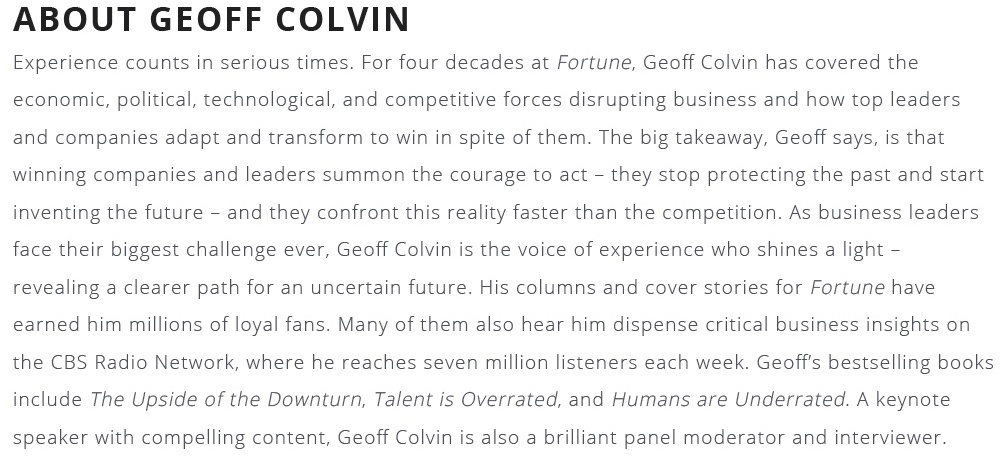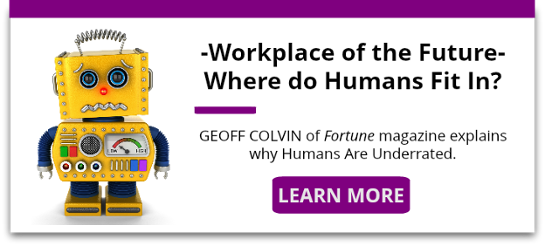Will You Be Replaced By Smart Machines?
On the eve of the release of his newest book, Humans are Underrated: What High Achievers Know That Brilliant Machines Never Will, Fortune magazine’s GEOFF COLVIN was interviewed on the future of work in a world where technology is eliminating more jobs than it creates. How will the rise of smart machines impact you? Your company? To read an excerpt from the book, check out this link to the August 1st Fortune cover story. The interview with Geoff is below:
Q: Many argue that robots will soon take all our jobs and make humans irrelevant. Yet you don’t hold this viewpoint – why not?
A: Because for sound economic reasons, we won’t want technology to do that. We are hardwired from our evolutionary past to value human relationships, and as a practical matter we must use those relationships to solve the most important human problems. Make no mistake – technology is profoundly reordering the value of human skills, and many people will continue to lose their jobs to technology. But the economy will reward people with different skills, primarily skills of human interaction.
Q: In fact, in the book, you write: “Viewed on the scale of the entire economy, technology’s advance indeed has not cost jobs, despite widespread fears. Quite the opposite.” Can you talk more about this?
A: Technology has improved the material well-being of humanity more than any other force in history, by a mile. It has lifted billions of people out of poverty and has raised living standards spectacularly. Nothing else comes remotely close. Yet people have continually feared the effects of technology. Since those fears have always proved unwarranted, it’s tempting to dismiss today’s fears as just more of the same. But they aren’t.
Q: Why do you think robots have become such a part of our national conversation recently?
A: Because robots are finally doing astounding things that touch people’s lives. They drive cars and trucks better than we do. They analyze documents in legal cases better than lawyers do. A recently introduced robot reads human emotions from facial expressions more accurately than people do and responds with an appropriate facial expression of its own. Robots even perform some surgical procedures autonomously. And the pace of advance is quickening. It’s impossible not to wonder: What will be left for us to do?
Q: You say that there will always be jobs that we insist be performed by other people. Can you give an example?
A: A great example that everyone can relate to is working together in small groups to solve problems. The reality of life is that multiple constituencies must be involved in solving the most important problems, and those problems inevitably change as we work on them, so human groups will have to solve them. The big surprise is that the key to group effectiveness is social sensitivity. The IQ of the group members means little, and other traditionally valued factors like group cohesion, satisfaction, and motivation contribute nothing. But the relationship skills of the members mean a ton.
If you’re making decisions all by yourself, then a) you’re not making the most important decisions; b) you’re not reaching the best possible decisions; and c) you’re increasingly in danger of being replaced by technology.
Q: In the future economy, what skills will we consider high-value? And what leads you to believe this?
A: The economy will value the skills of human interaction – empathy above all, collaborating, storytelling, leading, creating and innovating with others. One reason I believe this is that it simply makes sense in light of technology’s advance and our deepest human imperatives, as I’ve explained. Another reason is that it’s happening already. Major employers are increasingly saying they need workers with relationship skills, cultural sensitivity, and collaboration skills. They’re saying explicitly that knowledge skills are no longer worth much without interpersonal skills.
Q: Is it possible for workers and/or businesses to train for these skills?
A: Emphatically yes, despite what most people believe. We tend to think interpersonal abilities are traits, not skills – “She’s a born leader,” “He’s a real people person.” But all these abilities can be built and are being built at leading-edge institutions – the Cleveland Clinic, the U.S. Army, the Stanford Business School, and many others.
Q: At a time when you believe interpersonal abilities are becoming the key to creating value, those abilities are atrophying in many people. Why?
A: It’s the ironic flip side of advancing technology. As we spend more time with our digital devices, research shows that it’s making us less empathetic, more narcissistic, less adept at social interaction, and less able to bond with others. At just the moment when technology is demanding more of our deepest human abilities, it’s also causing those abilities to wither. Growing demand, shrinking supply – that’s the formula for high value.
Q: What’s one task you are looking forward to handing over to a robot someday?
A: Driving! As a rewarding activity, I rank it somewhere between washing lettuce and ironing clothes. I can’t wait to hand all of them over to brilliant machines.
About Tony D'Amelio
Tony has spent his career putting talented people and audiences together, first in the music business and later representing the world's leading speakers. After concluding 27 years as Executive Vice President of the Washington Speakers Bureau, Tony launched D'Amelio Network, a boutique firm that manages the speaking activities of a select group of experts on business, management, politics and current events. Clients include: Mike Abrashoff, Mariana Atencio, Chris Barton, Lisa Bodell, Geoff Colvin, Daryl Davis, Suneel Gupta, Ron Insana, Katty Kay, Polly LaBarre, Nicole Malachowski, Ken Schmidt, and Bob Woodward.

.png)

.jpg)


